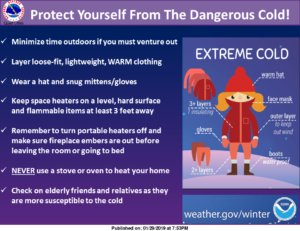
Photo by Aaron Burden on Unsplash
Recently, the midwest has seen brutally cold, record-low temperatures and dangerous winter weather that has resulted in school and business closings, chill warnings, and, unfortunately, multiple fatalities. At Great Care, we’re especially aware of the dangers these historical polar vortex conditions present, especially when it comes to our seniors and caregivers braving the elements to help others.
One of the most dangerous effects of this severe winter weather is hypothermia, which in turn can cause additional health problems that could be fatal if not treated. The National Institute on Aging (NIA) reminds us that for older individuals, a body temperature of 95°F or lower can cause health issues such as a heart attack, kidney problems, liver damage, or worse.
The NIA warns that being outside in the cold, or even being in a very cold house, can lead to hypothermia — a fact many seniors may not know.
”Try to stay away from cold places, and pay attention to how cold it is where you are,” the NIA says. “You can take steps to lower your chance of getting hypothermia.”
 In one example, the NIA listed a scenario when an older individual had turned down his thermostat to 62 degrees to save money, and was suffering from hypothermia, to his surprise. His son had paid him a visit and noticed hypothermia symptoms, promptly calling 911, which is what should be done right away when symptoms are exhibited.
In one example, the NIA listed a scenario when an older individual had turned down his thermostat to 62 degrees to save money, and was suffering from hypothermia, to his surprise. His son had paid him a visit and noticed hypothermia symptoms, promptly calling 911, which is what should be done right away when symptoms are exhibited.
The NIA lists early signs of hypothermia as cold feet and hands; puffy or swollen face; pale skin; shivering (in some cases the person with hypothermia does not shiver); slower than normal speech or slurring words; acting sleepy; and being angry or confused.
As well as later signs of hypothermia: Moving slowly, trouble walking, or being clumsy; stiff and jerky arm or leg movements; slow heartbeat; slow, shallow breathing; and blacking out or losing consciousness.
One precaution for seniors in avoiding hypothermia is to ask their doctors if their prescriptions or over-the-counter drugs, such as anti-depressants and cold and flu medications, put them at elevated risk. Also, diseases common in seniors such as dementia and Alzheimer’s, Parkinson’s, diabetes, hypothyroidism, arthritis, heart disease, and stroke, can lose issues with staying warm or maintaining a normal body temperature.
For seniors who may need assistance in paying heating bills, especially during emergency weather situations, these resources are available:
National Energy Assistance Referral service at 1-866-674-6327 (toll-free; TTY, 1-866-367-6228) or email the National Energy Assistance Referral (NEAR) project for information about the Low Income Home Energy Assistance Program.
The professionals at Great Care are available to talk with you and your family about all of your home care needs, including respite care. Great Care is a non-medical in-home care agency providing quality and affordable elder care in Fishers, IN and the surrounding areas. Call (888) 240-9101 for more information.
Follow Us!